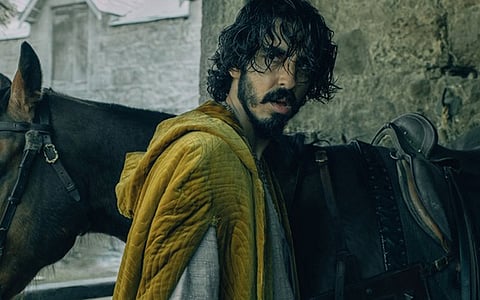
- Reviews
- Power List 2024
- Cannes 2024
- In-Depth Stories
- Web Stories
- News
- FC Lists
- Interviews
- Features
- FC SpecialsFC Specials

Director: David Lowery
Writer: David Lowery
Cast: Dev Patel, Alicia Vikader, Joel Edgerton, Sean Harris, Sarita Choudhary
Cinematographer: Andrew Droz Palermo
Editor: David Lowery
David Lowery's The Green Knight is neither an Arthurian fantasy tale nor an epic action adventure as the trailers would have you believe. It is much more, and perhaps, much less. It's a visually stunning, existential drama about humanity and morality that banks on the audience's familiarity with Arthurian folklore.
Based on the medieval chivalric romance Sir Gawain and The Green Knight, the film follows the story of Sir Gawain (Dev Patel) the cowardly nephew of King Arthur and the Kingdom's resident fuckboi. As the court gathers round on Christmas Day, King Arthur invites his nephew to sit at his side. Arthur loves him, but does he see a worthy successor in him? Perhaps not. This is a thought shared by Gawain's mother too, as she sets up a spell that brings The Green Knight to Arthur's court at that very moment.
This human-tree hybrid Knight challenges members of Arthur's court. If one of them were to land a blow on him, he'd reward them with his axe. However, any blow landed will be returned with the same severity one year later and must be accepted willingly. The knights of the round table are understandably cautious, but not Sir Gawain, who promptly decides to lob the Green Knight's head off. Imagine his surprise when the mythical creature just picks his head up and walks off, in anticipation of their meeting next Christmas.
Thus begins Lowery's movie. A year passes, and not much has become of Sir Gawain since. Now, he must begin his reluctant, suicidal journey to find The Green Knight, as promised. "Why greatness, why is goodness not enough?" asks Alicia Vikander's Essel of Sir Gawain, capturing the moral dilemma that forms most of the movie. It is an important question when you put Sir Gawain's character and his journey in perspective. For all obvious intents and purposes, he is not a good man, and certainly not a great one. So why is he undertaking this journey? Is it the pursuit of greatness, to overcome fears and be noble? Or is the pursuit of goodness?
Without a doubt, Dev Patel delivers the performance of a lifetime as Gawain, accentuating Lowery's moody, gorgeous hues with a performance that's both understated and strong in equal measure. There is a sense of naivete in his portrayal, few fleeting glimpses of fortitude and a seeming lack of empathy. His Gawain is indeed a hard man to sympathise with as he unequivocally disappoints everyone who loves or cares for him. Patel nails these nuances that film requires of him and stands tall against the mythical countryside with his slowly rotting golden cloak.
Alicia Vikander's performance as both Essel and The Lady is haunting. She delivers, with pathos and eloquence, the best dialogues in the film. You will also share the longing Joel Edgerton's The Lord feels, as he shares with the world his kindness that's often not returned in equal measure.
The narrative ascension doesn't feel organic, and the redemptions feel unearned
The Green Knight is a fascinating film, carried by the performances of its cast and its visual aesthetic. However, it feels neither deeply meditative nor wholly entertaining. Perhaps the overbearing, haunting score has something to do with it. It hammers away inside your skull, trying hard to remind you that one scene is scary, another is haunting, and a third is existential. Of course, it isn't unrealistic to expect The Green Knight's costume design to be a little more than green adult Groot either.
Treading across fantasy, adventure, human nature, and existential dread, The Green Knight has some stunning and breathtaking 'must-watch' moments. What it fails to be however, is the greatest sum of its parts. Its narrative ascension doesn't feel organic, and the redemptions feel unearned. Perhaps that's why it is fitting that the ending is left up to the audience to interpret.